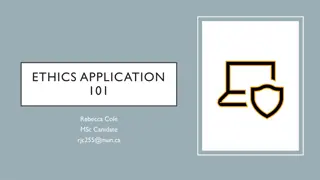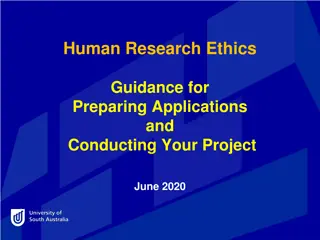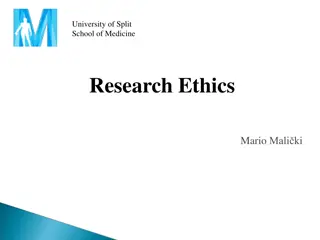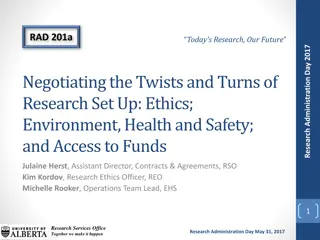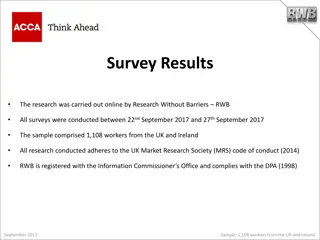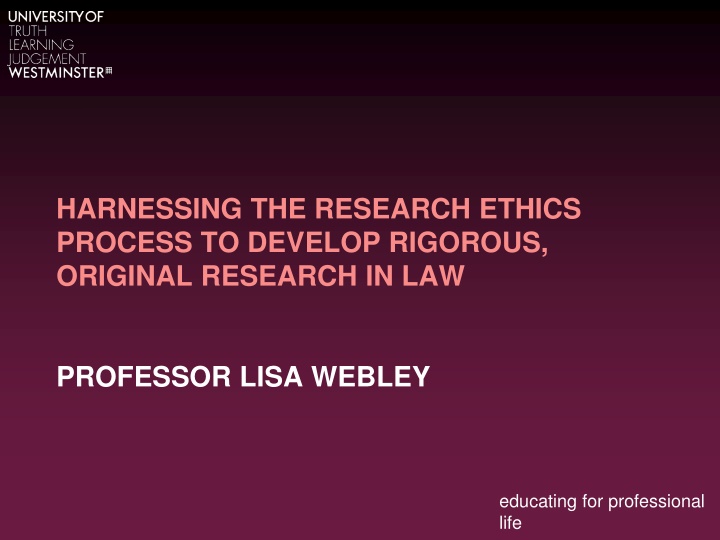
Developing Rigorous and Original Research in Law: Insights by Professor Lisa Webley
Explore the complexities of research ethics and roles in law practice, academic research, and ethical considerations in conducting legal research. Discover key markers of excellent academic research and how to harness the ethics process to enhance research integrity. Delve into the HKU Policy on Research Integrity for guiding principles.
Download Presentation

Please find below an Image/Link to download the presentation.
The content on the website is provided AS IS for your information and personal use only. It may not be sold, licensed, or shared on other websites without obtaining consent from the author. If you encounter any issues during the download, it is possible that the publisher has removed the file from their server.
You are allowed to download the files provided on this website for personal or commercial use, subject to the condition that they are used lawfully. All files are the property of their respective owners.
The content on the website is provided AS IS for your information and personal use only. It may not be sold, licensed, or shared on other websites without obtaining consent from the author.
E N D
Presentation Transcript
HARNESSING THE RESEARCH ETHICS PROCESS TO DEVELOP RIGOROUS, ORIGINAL RESEARCH IN LAW PROFESSOR LISA WEBLEY educating for professional life
Potential Role Confusion: being a lawyer versus being a researcher to build a case to serve a client or cause Research as a lawyer essentially the outcome is written or oral advocacy an academic, scientific enquiry to discover / test something Research as an academic an objective assessment fully reported and attributed
Potential Role Confusion Points of tension: serving a client or serving the academic community? Reflexivity, disclosure requirements and conflicts of interest. Competence in legal skills, similar levels of competence in social science or humanities skills? Research design and execution. Analysis and reporting findings: necessary partisanship vs. necessary objectivity. Bias, building a case, reporting all findings, disclosing prior publication/ reporting. Attribution: competition and collegiality.
Key Markers of Excellent Academic Research Originality Significance Rigour What about how you undertook your study demonstrates your process rigour, and how you drew your inferences and reached your conclusions demonstrates your analytical rigour? What new insight does your study add to academic knowledge? Why is your new addition of importance/ relevance/ interest?
Harnessing the Ethics Process to Assist Reflect on study aims & standpoint Literature review leading to hypotheses/ theories Consider impact of the research on others Iterative process of reflection Develop robust, reliable research design and means of analysis Delineate likely observable implications Consider range of data sources
HKU Policy on Research Integrity 1. Principles of Research Integrity honesty in the conduct and communication of research; objectivity and openness; duty of care; fairness in giving credit and appropriate acknowledgement; and responsibility for nurturing researchers of future generations.
HKU Requirements from Policy on Research Integrity Good practice in research requires: [2] all members of the University should commit to adhering to good research practices, which reflect the principles of research integrity. It is essential that the design of research projects follows all relevant ethical guidelines, and researchers should only participate in work which conforms to accepted ethical standards and which they are competent to perform. When in doubt they should seek assistance with their research from their senior colleagues or peers.
HKU Requirements from Policy on Research Integrity [2.1] All research should be conducted in a responsible manner. The design of the research should be well-considered, and research procedures should be carried out with care. Themost appropriate research methods should be employed, and conclusions should be based on critical and unbiased analysis of factual evidence. Research findings should be reported fully and in an objective manner. The design of the research should aim at maximizing the benefits and reducing the risks to participants of the research. There should be an appropriate balance between benefits and risks, and the well-being of the participants involved, especially those from vulnerable groups (such as young children and the mentally disadvantaged), should be protected.
HKU Requirements from Policy on Research Integrity 2.2 Publication-related conduct Research results should be published in a timely manner, and publications should be based on objective analysis and interpretation of accurate research data in an honest and transparent manner. Authorship should only be based on contribution to the research proper, including contribution to the design of the study, data collection, data analysis, and reporting; and should not be for merely administrative roles. Also sections on: care and safety; proper data handling; disclosure of conflicts of interest; compliance with relevant regulations; contract research; reporting irresponsible research practices; special needs in different disciplines; research misconduct.
HKU Requirements from Policy on Research Integrity Ethics Committee approval is needed for: All experiments or other forms of research project, where the University has an interest, involving consent of human participants and the use of vertebrate animal subjects must obtain prior approval of the appropriate Ethics Committee. Informed consent of human participants should be appropriately documented. Clients or sponsors should be alerted to the ethical and legal obligations of the researcher, and to the possible restrictions this may impose on the research.
Ethical Reflection and Excellent Research Design A paragraph or two on the context to one s study (background: usually the nature of the problem) A brief (relevant) literature review to position one s study within current academic knowledge (fully attributed) A clear research question (why this question?) The study aims crisply set out (the point of the study) Data collection and analysis methods delineated and how they will help to answer the question (link between question, hypotheses or sub-questions, data, methods, analysis) Reflection on the ethics, benefits and risks of one s study on others (during the study, after the study) Consideration of alternative means to answer one s research questions so as to minimise risk A statement of what one hopes to achieve through the study in the longer term, if known.
Use of the Early Stage Literature Review Which parts of our research- question(s) Has been answered to your satisfaction in another s study Not Answered by others, but not to your satisfaction. How so? answered by others, and so you need to fill the lacuna.
Use of the Writing Up Phase of the Literature Review Reflection on the literature to date allows us critically to analyse what has gone before and to help with later research design. One suggested approach to writing to aid reflection: Our own analysis opens the paragraph; The evidence that has led us to that conclusions follows (this is our justification for how we know we are correct in our analysis); Our higher level critical analysis rounds off the paragraph (what is means in the context of our study). This may help to refine the research question, develop hypotheses/theories, suggest avenues for investigation to be worked into the research design.
BEYOND THE LITERATURE: RESEARCH DESIGN educating for professional life
Following the literature review It should be possible to identify what is your original research question: It is what remains of your original question that is unanswered or not adequately answered in the existing academic literature You may now design your study. This phase, of sorting out the method in the light of your question, then putting it into effect, establishes the basis for your claim of process rigour.
Research Design What research question am I answering? What are my hypotheses/theories/propositions? What would be their observable implications? What would I expect to see were they to be facts? What data is available so as to test them? How will I collect it, how will I analyse it? What are the ethical issues that arise, what are the risks and the benefits? What training do I need, if any?
Sources of Law Data Evidence of unwritten law: (discovered in different ways in different context) Judicial precedent (available through case reports, usually) Written text of the law: international or domestic, primary, secondary etc Jurisprudence or doctrine used in court (depending on jurisdiction) Other?
Other Sources of Data People (via interviews, surveys or observation): sociological, psychological or anthropological modes of data collection and analysis Policy or other documents: political science and policy data collection and analysis Visual culture studies: photographic or media or film archives, crime scene photographs Media studies: Newspaper, blogpost, news bulletins Economic data: economics or econometrics
Quantitative and Qualitative Methods Quantitative Methods Large representative data-sets to be useful and reliable. Qualitative Methods No need for large representative data sets, but do need to produce detailed data for each case/participant. Tend to yield useful baseline data. Tend to yield detail rather than overview. Often good to answer what, where, how . Less good on why unless one employs a sophisticated method and mode of analysis (inferential statistics). Often good to capture attitudes, experiences, values. But cannot easily generalise from these findings. They are particular to the participants themselves.
Research Obligations and Ways to Minimise Ethical Concerns Obligations to Research Participants: Truly informed consent Right to withdraw Responsibility to participants both during and after research phases Confidentiality unless otherwise agreed No covert research (unless agreed with University Ethics Committee)
Research Obligations and Ways to Minimise Ethical Concerns Obligations to the academic community and to research Understanding our role in the research, acknowledging our standpoint and our influences on participants and third parties Taking practical steps to minimise ethical concerns Think through the ethics Discuss it with others Seek advice
Harnessing Ethical Reflection Assists us to use the literature effectively Assists us to think through our theories/hypotheses/propositions Assists with research design Assists with the quality of analysis Prompts us to consider our role (lawyer, academic researcher) Helps us to help our students and junior colleagues to develop their research practice Keeps us out of trouble!



